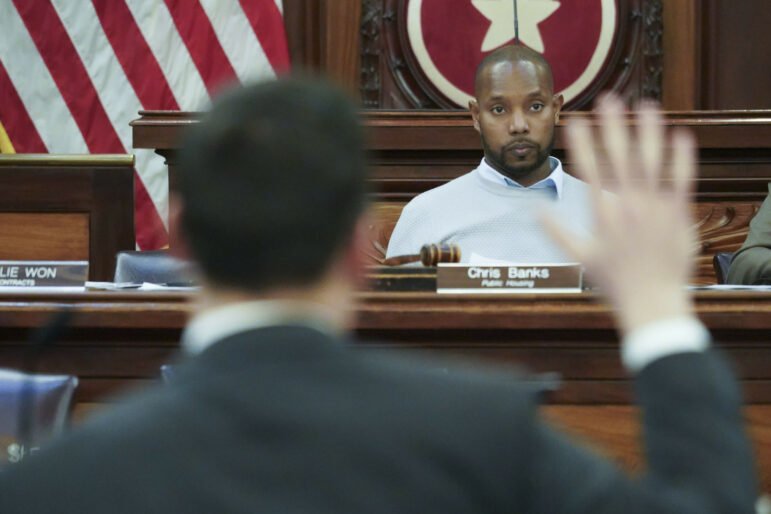“In the 50 years since the Equal Credit Opportunity Act became law, so much has changed: women are home buyers, can open credit cards and despite a persistent gender wage gap, are able to accumulate wealth. But for survivors of domestic violence, the vast majority of whom experience economic abuse, so much remains the same.”

John McCarten/NYC Council Media Unit
Hank Aaron shattered Babe Ruth’s homerun record, Richard Nixon became the first American President to resign from office. Boston was ordered to begin desegregating its public school system and “Happy Days” made its small screen debut.
The year was 1974. And for the first time in history, women were granted the right to open a credit card in their own name. The Equal Credit Opportunity Act (ECOA), which was later amended to prohibit widespread credit discrimination on the basis of race, color, religion, national origin, sex, gender and marital status, became law in 1974 at a time when financial and other forms of discrimination against women was rampant.
Though women were technically permitted to open a bank account in the 1960s, most banks required the signature of a husband to do so. Many mortgage lenders would not consider a married woman’s income if she was of child bearing age, and single women often could not qualify for mortgages on their own. Women could not open a credit card account in their own name, nor could they build individual credit histories.
Men controlled women’s access to finances, and denied them the ability to accumulate wealth, savings and financial stability, directly affecting the ability to be safely housed.
In the 50 years since the ECOA became law, so much has changed: women are home buyers, can open credit cards and despite a persistent gender wage gap, are able to accumulate wealth. But for survivors of domestic violence, the vast majority of whom experience economic abuse, so much remains the same.
New York City recently defined economic abuse as a form of domestic violence. Economic abuse is nearly universally experienced by domestic violence survivors, and it is also deadly: the majority of survivors cite economic abuse as among the primary reasons they stay in or return to an abusive environment.
Economic abuse can take many forms, including preventing a survivor from maintaining employment, controlling and withholding money, providing an “allowance,” lying about assets, restricting access to finances, credit or important financial documents. One especially pernicious form of economic abuse is coerced debt, which occurs when force, threats, intimidation and/or lies are used to cause a survivor to incur a debt.
While domestic violence does not discriminate, women are 1.5 times more likely than men to experience intimate partner violence. And Black and Hispanic women are more likely to be seriously injured or killed than white women as a result of intimate partner violence. Moreover, transgender populations experience a twofold increase in such violence.
For women experiencing domestic violence and the economic abuse that so often accompanies it, it might as well still be 1974. Many survivors cannot control their finances or plan for their futures, they are prohibited from working or attending school, and as a result of coerced debt, they are saddled with high debt loads and low credit scores, which make it difficult to access housing, employment, cell phones, vehicles and ultimately, safety.
In 2024, this is simply unacceptable. We have tools to help survivors of domestic violence achieve financial autonomy. New York must expand access to direct cash assistance programs and to low and no barrier cash grants, which will remove a significant obstacle to safety by addressing survivors’ immediate financial needs.
We must ensure that there is an adequate supply of stable temporary and permanent supportive and affordable housing so that when they are ready, survivors have a safe place from which to heal.
Funding for career counseling, job training and internship placement will help survivors secure living-wage employment. And free childcare will enable survivors to secure housing and employment and manage legal and other appointments.
There are currently no laws on the books to relieve survivors of a coerced debt burden. New York State must pass A.1309/S.2278-A, sponsored by Assemblymember Linda B. Rosenthal and State Senator Cordell Cleare, as an important first step. This legislation will provide survivors of domestic violence with a legal means to prove a debt that was coerced as a result of identity theft, fraud, force, or other illegitimate means, and to discharge the coerced debt and remove any negative marks on their credit report related to it.
Taken together, these policies will help usher in the 21st century for countless survivors of domestic violence who continue to live like it’s 1974 because the law has not changed to reflect the growing threat that economic abuse poses for survivors and their ability to achieve safety.
April is Financial Safety and Stability month. In 2024, we have the tools to ensure that survivors of domestic violence who have experienced economic abuse can take control of their finances and build a safe and stable future. We must not leave any survivors behind in 1974.
Nathaniel Fields (he, him, his) is the chief executive officer of Urban Resource Institute (URI). blair doroshwalther (they, him) is the program director of the Economic Empowerment Program at URI. Teal Inzunza (she/her/hers) is the associate vice president of justice initiatives at URI.








